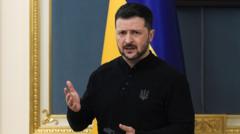As the Baltic states gear up for their historic transition away from the Russian-controlled Brell power grid, residents brace for a temporary power isolation before connecting to the European electricity network.
**Baltic States Prepare to Disconnect from Russian Power Grid**

**Baltic States Prepare to Disconnect from Russian Power Grid**
Baltic nations Estonia, Latvia, and Lithuania are set to sever ties with Russia's electricity network, marking a major energy independence milestone.
The Baltic states, having been free from Soviet control for over three decades, are taking a significant step towards energy independence as they prepare to disconnect from the Russian power grid. The transition process will commence on Saturday and is being marked by a public awareness campaign urging residents to stock up on necessities and prepare as if expecting severe weather. Residents have been advised to charge their devices, accumulate food and water supplies, and avoid using elevators to ensure safety during the brief transition period.
A countdown clock will highlight the pivotal moment during a ceremony in Lithuania’s capital on Sunday, which will be graced by EU Commission President Ursula von der Leyen. The switch signifies the Baltic nations' break from the Brell power grid, which has linked them to Russia and Belarus since World War Two. Containing mostly Russian control, the old grid had been viewed as a strategic liability by Baltic countries looking to sever energy dependency.
Lithuania's Energy Minister Zygimantas Vaiciunas emphasized the significance of this shift, stating, “We are now removing Russia's ability to use the electricity system as a tool of geopolitical blackmail.” Experts, including Prof David Smith from the Baltic Research Unit at the University of Glasgow, view this transition as the fruit of over two decades of effort aimed at decreasing reliance on Russian energy resources.
Recent geopolitical tensions following Russia’s invasion of Ukraine have heightened fears of potential retaliation against this energy shift. Suspicious incidents involving damage to undersea cables in the Baltic Sea have raised security concerns among the nations sharing a 543-mile border with Russia. In response, NATO has enhanced its military presence in the region, launching the Baltic Sentry patrol mission to safeguard critical infrastructure.
Leaders of the Baltic nations, including Latvian President Edgars Rinkēvičs, have acknowledged the risks associated with the transition but maintain confidence in their contingency plans to handle any provocations. Additionally, they are prepared for heightened cybersecurity threats and misinformation campaigns, indicative of the ongoing regional tensions. Estonia's Cybersecurity Centre has heightened vigilance, noting an uptick in cyber-attacks since the escalation of conflict in Ukraine.
As the Baltic states embark on this crucial energy transition, they strive for autonomy while remaining alert to the risks posed by their historical neighbor.
A countdown clock will highlight the pivotal moment during a ceremony in Lithuania’s capital on Sunday, which will be graced by EU Commission President Ursula von der Leyen. The switch signifies the Baltic nations' break from the Brell power grid, which has linked them to Russia and Belarus since World War Two. Containing mostly Russian control, the old grid had been viewed as a strategic liability by Baltic countries looking to sever energy dependency.
Lithuania's Energy Minister Zygimantas Vaiciunas emphasized the significance of this shift, stating, “We are now removing Russia's ability to use the electricity system as a tool of geopolitical blackmail.” Experts, including Prof David Smith from the Baltic Research Unit at the University of Glasgow, view this transition as the fruit of over two decades of effort aimed at decreasing reliance on Russian energy resources.
Recent geopolitical tensions following Russia’s invasion of Ukraine have heightened fears of potential retaliation against this energy shift. Suspicious incidents involving damage to undersea cables in the Baltic Sea have raised security concerns among the nations sharing a 543-mile border with Russia. In response, NATO has enhanced its military presence in the region, launching the Baltic Sentry patrol mission to safeguard critical infrastructure.
Leaders of the Baltic nations, including Latvian President Edgars Rinkēvičs, have acknowledged the risks associated with the transition but maintain confidence in their contingency plans to handle any provocations. Additionally, they are prepared for heightened cybersecurity threats and misinformation campaigns, indicative of the ongoing regional tensions. Estonia's Cybersecurity Centre has heightened vigilance, noting an uptick in cyber-attacks since the escalation of conflict in Ukraine.
As the Baltic states embark on this crucial energy transition, they strive for autonomy while remaining alert to the risks posed by their historical neighbor.





















